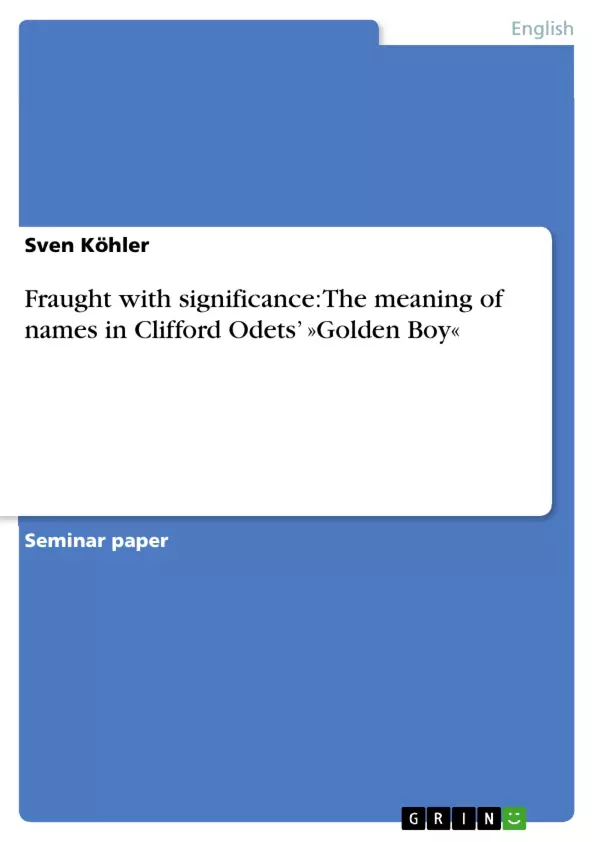The present composition will describe and elucidate derivations and meanings of selected names in CLIFFORD ODETS’ play »GOLDEN BOY«. In this, the structure guides along the order of speech in the play. Further on the traced results will be analysed with regard to the contents to find out potential connections between the textual theme and the meaning of the respective names.
Inhaltsverzeichnis (Table of Contents)
- Introduction
- Main Part
- Tom Moody
- Lorna Moon
- Joe Bonaparte
- Tokio
- Mr. Carp
- Siggie
- Mr. Bonaparte
- Anna
- Roxy Gottlieb
- Eddie Fuseli
- Mickey
- Sam
- Lewis
- Drake
- Driscoll
- Barker
- Conclusion
Zielsetzung und Themenschwerpunkte (Objectives and Key Themes)
This composition aims to explore the derivations and meanings of selected names in Clifford Odets' play "Golden Boy," analyzing their potential connections to the play's themes. The analysis follows the order of character appearances in the play.
- The relationship between character names and their personalities/destinies.
- The use of names to foreshadow events or themes within the narrative.
- The symbolic meaning of names in relation to the overall plot of the play.
- The interplay between personal identity and societal pressures.
- The exploration of ambition, success and the cost of achieving them.
Zusammenfassung der Kapitel (Chapter Summaries)
Introduction: This introduction lays out the purpose of the paper, which is to examine the names of characters in Odets' "Golden Boy" and how their etymologies and meanings relate to the play's themes and events. The methodology is also outlined; the analysis will follow the chronological order in which the characters are introduced in the play.
Main Part: This section delves into the analysis of several key characters' names. It starts with an in-depth study of individual names, exploring their etymological roots and potential symbolic significance. The analysis connects the meanings of these names to the characters' actions, motivations, and relationships, providing textual examples to support these interpretations. Each character’s name is examined in relation to their role in the play’s larger themes and narrative development. The analyses consistently demonstrate how the names function not merely as identifiers but as integral components of the play's overall meaning.
Schlüsselwörter (Keywords)
Clifford Odets, Golden Boy, character names, etymology, symbolism, thematic analysis, dramatic irony, character development, ambition, identity, social commentary.
Frequently Asked Questions: A Thematic Analysis of Character Names in Clifford Odets' "Golden Boy"
What is the purpose of this document?
This document provides a comprehensive preview of a thematic analysis of character names in Clifford Odets' play, "Golden Boy." It includes a table of contents, objectives and key themes, chapter summaries, and keywords. The analysis focuses on the etymological and symbolic meanings of the names and their connections to the play's overarching themes.
What is the scope of the analysis?
The analysis examines the relationship between character names and their personalities, destinies, and roles in the play's narrative. It explores how names might foreshadow events or themes, and how they contribute to the play's symbolic meaning and overall plot. The study also considers the interplay between personal identity and societal pressures, as well as the exploration of ambition, success, and their costs.
Which characters are analyzed?
The main part of the analysis focuses on a series of characters from "Golden Boy," including Tom Moody, Lorna Moon, Joe Bonaparte, Tokio, Mr. Carp, Siggie, Mr. Bonaparte, Anna, Roxy Gottlieb, Eddie Fuseli, Mickey, Sam, Lewis, Drake, Driscoll, and Barker. The analysis follows the order of their appearance in the play.
What methodology is used in the analysis?
The analysis follows a chronological approach, examining each character's name in the order they appear in Odets' play. It involves in-depth study of individual names, exploring their etymological roots and potential symbolic significance. The analysis connects these meanings to the characters' actions, motivations, and relationships, using textual examples from the play to support interpretations.
What are the key themes explored?
Key themes explored include the relationship between character names and their personalities/destinies; the use of names to foreshadow events or themes; the symbolic meaning of names in relation to the overall plot; the interplay between personal identity and societal pressures; and the exploration of ambition, success, and the cost of achieving them.
What are the key words associated with this analysis?
Keywords include: Clifford Odets, Golden Boy, character names, etymology, symbolism, thematic analysis, dramatic irony, character development, ambition, identity, and social commentary.
What is included in the introduction?
The introduction outlines the purpose of the paper – to examine the names of characters in Odets' "Golden Boy" and their etymological and symbolic relationship to the play's themes and events. It also details the methodology: a chronological analysis following the order of character introductions in the play.
What is covered in the main part of the analysis?
The main part provides an in-depth analysis of several key characters' names, exploring their etymological roots and symbolic significance. It connects the meanings of these names to the characters' actions, motivations, and relationships within the play's larger themes and narrative development.
What is the conclusion?
While not explicitly detailed in the preview, the conclusion would likely summarize the findings of the analysis, reiterating how the names function as integral components of the play's overall meaning.
- Citar trabajo
- Sven Köhler (Autor), 2005, Fraught with significance: The meaning of names in Clifford Odets’ »Golden Boy«, Múnich, GRIN Verlag, https://www.grin.com/document/80668



